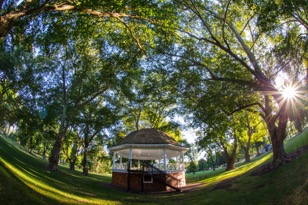Hometown

"I hardly recognize the place anymore."
I stand a bit taller than the crescent of mountains protectively gazing down into this valley. Of course my perception must be an optical illusion, but Walla Walla has always thrived on illusions. From the valley floor, the sky seems to arc over its perimeter, giving the illusion of standing in the center of a half globe, a snow globe lacking only snow and a firm shake to convincingly produce a small snowstorm on demand. The weather tends to be gentle here, protected by moderating currents in the Pacific ocean, three hundred miles West, the influence swimming upstream along the broad and beautiful Columbia Gorge to impart what the Chamber of Commerce swears amounts to a Mediterranean climate, which, of course, it isn't. It's no Montana, either, but it lacks appreciable humidity to convincingly mimic Sardinia. ©2018 by David A. Schmaltz - all rights reserved
Promoters insist that it's a well-kept secret, and it maintains this distinction no matter how much international press the place garners. Locals stand protectively proud when the New York Times mentions the place in another article clearly written by someone who never spent more than a wine tasting weekend here. Few locals attend these affairs, tending more toward beer or abstinence instead. Somebody's building a "world class" resort out on a piece of repurposed dryland wheat field, complete with a purpose-built "lake" and a James Beard Award-winning chef. Supposedly a magnet and a sign of great things to come, real estate prices have put a standard home out of working class range. The city has capped the number of permits available for short term housing rentals after watching speculators grab up modest bungalows, refurbishing them only to essentially take them off the market. They sure look good in promotional brochures, though.
Sports fans unconditionally support the Seahawks, Mariners, Gonzaga, and The Cougs. The gang at the Main Street Starbucks (one of five in The Valley) assemble at five each morning to loudly report on the fortunes of the local basketball team, the formerly-named Whitman College Missionaries, now The Blues after college officials announced that the Missionaries’ mascot was considered noninclusive, imperialistic and incorrectly implied that Whitman was a religious school. Town and Gown thrives here. Six bucks will get you a seat in the Sherwood Center gym. You'll be lucky to get one.
A five minute drive in any direction will get you to the edge of town. To the West, the top of The Palouse gives way to a hundred miles of scablands, now impressively irrigated, leftover from a series of cataclysmic floods ending the last Ice Age. To the North, The Valley gives way to the broad Palouse, a country of gently rolling wheat and legume fields stretching to Spokane, interrupted by The Snake's harsh intrusion, all basalt and scrub. There's no way out of The Valley to the East, The Blue Mountains blocking passage. Pendleton's South-ish, guarding the sole passages through The Blues. There's no direct way in or out of this snow globe. Nobody arrives or leaves by accident.
My ancestors arrived here in 1879, fresh from Iowa, willing to overwinter in a tent on an established spread for the opportunity to homestead in The West. Two of their sons died of dypyheria that winter. Nobody knows where those boys were buried. The Nez Perce ruled near here. The Cayuse and Walla Walla defended the place, with the Umatilla nearby. They planned for seven generations into the future, and though their plans seemed to come to naught, they continue the practice, frustrated that the US Governments struggle to plan to the end of next week. They are confederated tribes now, a sovereign nation bilking the innumerate who flock to their casino, using profits to restore rivers and sacred fisheries.
I think of this place as my home, or, at least, my Hometown. I hold it both deep within my heart and arm's-length contempt. It possesses both proud and humiliating history, as I suppose every place does. It held the seat of The Washington Territorial government when Washington Territory stretched from the Pacific to Nebraska, when fabled buffalo still roamed the western plains, when salmon migrated in such profusion that one could walk across the Columbia on their backs. Of course you couldn't. That was a story, hyperbole of the sort always employed by people who deep down feel inferior and express that second-class sense by boasting how much better they are.
We are proud yokels here, about as sophisticated as we believe ourselves to need to be. Our most prosperous days ended more than a hundred years ago when Main Street was lined with bordellos, and Seattle and Spokane started becoming more than a single sawmill each. The silver in Northern Idaho started petering out and the gold in Alaska drew the attention of the world away from The Valley They Liked So Well, They Named It Twice. The place went into steady decline into the nineteen nineties when wineries started appearing like a long-denied promise on a fish-eye horizon. I left the place as Main Street started turning into hapless consignment shops and returned when those historic old brick buildings were half gone, and tasting rooms and cute crap shops started moving into those remaining. The Muse and I left after realizing that we could not make a living here, but we retained our house, our home, here, if only to sustain the faith that we might one day return. Everyone needs a hometown if only for the fabled illusions it provides. Visitors can see right through the artifices the residents thrive on. I hardly recognize the place anymore.


